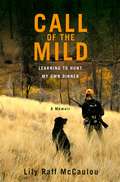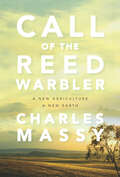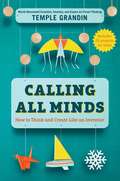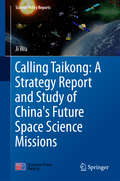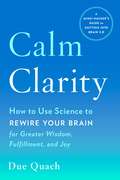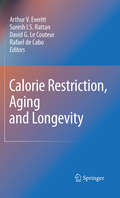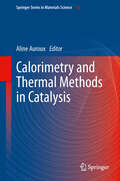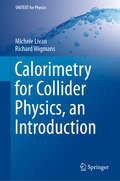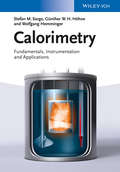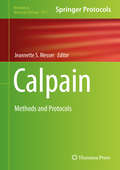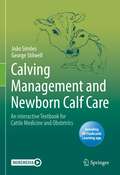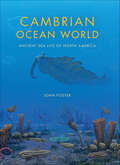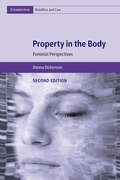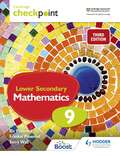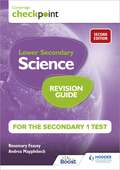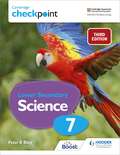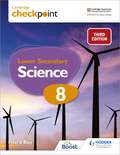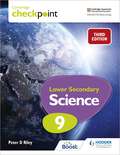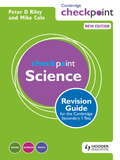- Table View
- List View
Call of the Mild: Learning to Hunt My Own Dinner
by Lily Raff MccaulouWhen Lily Raff McCaulou traded in an indie film production career in New York for a reporting job in central Oregon, she never imagined that she'd find herself picking up a gun and learning to hunt. She'd been raised as a gun-fearing environmentalist and an animal lover, and though a meat-eater, she'd always abided by the principle that harming animals is wrong. But Raff McCaulou's perspective shifted when she began spending weekends fly-fishing and weekdays interviewing hunters for her articles, realizing that many of them were more thoughtful about animals and the environment than she was. So she embarked upon the project of learning to hunt from square one. From attending a Hunter Safety course designed for children to field dressing an elk and serving it for dinner, she explores the sport of hunting and all it entails, and tackles the big questions surrounding one of the most misunderstood American practices and pastimes. Not just a personal memoir, this book also explores the role of the hunter in the twenty-first century, the tension (at times artificial) between hunters and environmentalists, and new models of sustainable and ethical food procurement.
Call of the Reed Warbler: A New Agriculture, A New Earth
by Charles Massy&“Charles Massy has written a definitive masterpiece that takes its place along with the writings of Aldo Leopold, Wendell Berry, Masanobu Fukuoka, Humberto Maturana, and Michael Pollan. No work has more brilliantly defined regenerative agriculture and the breadth of its restorative impact upon human health, biodiversity, climate, and ecological intelligence.&”—Paul HawkenIn Call of the Reed Warbler, Charles Massy explores regenerative agriculture and the vital connection between our soil and our health.It is the story of how a grassroots revolution—a true underground insurgency—can save the planet, help reduce and reverse climate change, and build healthy people and healthy communities, pivoting significantly on our relationship with growing and consuming food.Using his personal experience as a touchstone—from an unknowing, chemical-using farmer with dead soils to a radical ecologist farmer carefully regenerating a 2000-hectare property to a state of natural health—Massy tells the real story behind industrial agriculture and the global profit-obsessed corporations driving it. With evocative stories, he shows how other innovative and courageous farmers are finding a new way.At stake is not only a revolution in human health and in our communities, but the very survival of the planet. For farmers, backyard gardeners, food buyers, health workers, policy makers, and public leaders alike, Call of the Reed Warbler offers a tangible path forward and a powerful and moving paean of hope.It&’s not too late to regenerate the earth. Call of the Reed Warbler shows the way forward for the future of our food supply, our planet, and our health.&“Part lyrical nature writing, part storytelling, part solid scientific evidence, part scholarly research, part memoir, [this] book is an elegant manifesto, an urgent call to stop trashing the Earth and start healing it.&”—The Guardian
Calling All Minds: How To Think and Create Like an Inventor
by Temple GrandinFrom world-renowned autism spokesperson, scientist, and inventor Temple Grandin -- a book of personal stories, inventions, and facts that will blow young inventors' minds and make them soar.Have you ever wondered what makes a kite fly or a boat float? Have you ever thought about why snowflakes are symmetrical, or why golf balls have dimples? Have you ever tried to make a kaleidoscope or build a pair of stilts? <p><p>In Calling All Minds, Temple Grandin explores the ideas behind all of those questions and more. She delves into the science behind inventions, the steps various people took to create and improve upon ideas as they evolved, and the ways in which young inventors can continue to think about and understand what it means to tinker, to fiddle, and to innovate. And laced throughout it all, Temple gives us glimpses into her own childhood tinkering, building, and inventing. <p>More than a blueprint for how to build things, in Calling All Minds Temple Grandin creates a blueprint for different ways to look at the world. And more than a call to action, she gives a call to imagination, and shows readers that there is truly no single way to approach any given problem--but that an open and inquisitive mind is always key. <P><b>A New York Times Bestseller</b>
Calling Taikong: A Strategy Report and Study of China's Future Space Science Missions (Science Policy Reports)
by Ji WuThis book describes the status quo of space science in China, details the scientific questions to be addressed by the Chinese space science community in 2016-2030, and proposes key strategic goals, space science programs and missions, the roadmap and implementation approaches. Further, it explores the supporting technologies needed and provides an outlook of space science beyond the year 2030. "Taikong" means "outer space" in Chinese, and space science is one of the most important areas China plans to develop in the near future. This book is authored by WU Ji, a leader of China's space science program, together with National Space Science Center, Chinese Academy of Sciences, a leading institute responsible for planning and managing most of China's space science missions. It also embodies the viewpoints shared by many space scientists and experts on future space science development. Through this book, general readers and researchers alike will gain essential insights into the current developments and future prospects of space science in China. Government decision-makers will also find the book a useful reference for strategies and planning in the field of space science.
Calm
by Iben HaveA short but engaging look at how to cultivate a sense of calm in our busy world.In Calm, sound and media researcher Iben Have explores how to cultivate a feeling of calm using digital technologies, sound, routines, and mindfulness training, and our own bodies and minds. Professor Have delves into the science behind human perception and sensory experience to discover that our perceptual experiences are not based on culture alone, but are rooted in a deeper, shared human phenomenon. While creativity generally requires calm, our need for peace and quiet varies greatly. Some people need lots of stimulus, whereas others feel most alert in tranquil environments. By determining the right stimulation zone, Professor Have outlines how we can perform and feel our best, existing mindfully and in the present.In Reflections, a series copublished with Denmark's Aarhus University Press, scholars deliver 60-page reflections on key concepts. These books present unique insights on a wide range of topics that entertain and enlighten readers with exciting discoveries and new perspectives.
Calm Clarity: How to Use Science to Rewire Your Brain for Greater Wisdom, Fulfillment, and Joy
by Due QuachAuthor of the viral Medium piece, "Poor and Traumatized at Harvard," Due Quach shares her Calm Clarity program to show readers how to deal with toxic stress and adversity.We often don't realize how much control we have over our thoughts, feelings, and actions--on some days, the most minor irritation can upset us, but on others, we are in our best form and can rise to challenges with grace. These fluctuations depend on the neural networks firing in our brains, and we have the power to consciously break hardwired thought patterns. Due Quach developed an intimate understanding of the brain during her personal journey of healing from post-traumatic stress disorder. According to Quach, people function in three primary emotional states: Brain 1.0, Brain 2.0, and Brain 3.0. In Brain 1.0, people act out of fear and self-preservation. Brain 2.0 involves instant gratification and chasing short-term rewards at the expense of long-term well-being. Brain 3.0 is a state of mind that Quach calls "Calm Clarity," in which people's actions are aligned with their core values. As Quach confronted PTSD and successfully weaned herself off medication, she learned how to activate, exercise, and strengthen Brain 3.0 like a muscle. In Calm Clarity, she draws on the latest scientific research and ancient spiritual traditions alike to show us how we too can take ownership of our thoughts, feelings, and actions in order to be our best selves.
Calorie Restriction, Aging and Longevity
by David G. Couteur Rafael De Cabo Suresh I. Rattan Arthur V. EverittFood or calorie restriction has been shown in many short-lived animals and the rhesus monkey to prolong life-span. Life-long nutrition studies are not possible in humans because of their long survival. Studies over two to six years in healthy adult humans have, however, shown that a 20% reduction in food or calorie intake slows many indices of normal and disease-related aging. Thus, it is widely believed that long-term reduction in calorie or food intake will delay the onset of age-related diseases such as heart disease, diabetes and cancer, and so prolong life. Over the last 20 or more years there has been a progressive rise in food intake in many countries of the world, accompanied by a rising incidence of obesity. Thus our increasing food and calorie intake has been linked to the rising incidence of cardiovascular disease and diabetes in early adult life. It is accepted that overeating, accompanied by reduced physical exercise, will lead to more age-related diseases and shortening of life-span. The answer is to reduce our calorie intake, improve our diet, and exercise more. But calorie restriction is extremely difficult to maintain for long periods. How then can we solve this problem? Edited by a team of highly distinguished academics, this book provides the latest information on the beneficial effects of calorie restriction on health and life-span. This book brings us closer to an understanding at the molecular, cellular and whole organism level of the way forward.
Calorimetry and Thermal Methods in Catalysis (Springer Series in Materials Science #154)
by Aline AurouxThe book is about calorimetry and thermal analysis methods, alone or linked to other techniques, as applied to the characterization of catalysts, supports and adsorbents, and to the study of catalytic reactions in various domains: air and wastewater treatment, clean and renewable energies, refining of hydrocarbons, green chemistry, hydrogen production and storage. The book is intended to fill the gap between the basic thermodynamic and kinetics concepts acquired by students during their academic formation, and the use of experimental techniques such as thermal analysis and calorimetry to answer practical questions. Moreover, it supplies insights into the various thermal and calorimetric methods which can be employed in studies aimed at characterizing the physico-chemical properties of solid adsorbents, supports and catalysts, and the processes related to the adsorption desorption phenomena of the reactants and/or products of catalytic reactions. The book also covers the basic concepts for physico-chemical comprehension of the relevant phenomena. Thermodynamic and kinetic aspects of the catalytic reactions can be fruitfully investigated by means of thermal analysis and calorimetric methods, in order to better understand the sequence of the elemental steps in the catalysed reaction. So the fundamental theory behind the various thermal analysis and calorimetric techniques and methods also are illustrated.
Calorimetry for Collider Physics, an Introduction (UNITEXT for Physics)
by Michele Livan Richard WigmansThis book is exceptional in offering a thorough but accessible introduction to calorimetry that will meet the needs of both students and researchers in the field of particle physics. It is designed to provide the sound knowledge of the basics of calorimetry and of calorimetric techniques and instrumentation that is mandatory for any physicist involved in the design and construction of large experiments or in data analysis. An important feature is the correction of a number of persistent common misconceptions. Among the topics covered are the physics and development of electromagnetic showers, electromagnetic calorimetry, the physics and development of hadron showers, hadron calorimetry, and calibration of a calorimeter. Two chapters are devoted to more promising calorimetric techniques for the next collider. Calorimetry for Collider Physics, an introduction will be of value for all who are seeking a reliable guide to calorimetry that occupies the middle ground between the brief chapter in a generic book on particle detection and the highly complex and lengthy reference book.
Calorimetry: Fundamentals, Instrumentation and Applications
by Günther W. Höhne Stefan Mathias Sarge Wolfgang HemmingerClearly divided into three parts, this practical book begins by dealing with all fundamental aspects of calorimetry. The second part looks at the equipment used and new developments. The third and final section provides measurement guidelines in order to obtain the best results. The result is optimized knowledge for users of this technique, supplemented with practical tips and tricks.
Calpain: Methods and Protocols (Methods in Molecular Biology #1915)
by Jeannette S. MesserThis volume brings together a plethora of protocols and experimental methods used by scientists to study calpains, their inhibitors, and their substrates. It also explores bioinformatic approaches to calpain substrate identification. The chapters in this book are divided into five parts and cover topics such as production and purification of calpains; determination of calpain localization, expression, and activity; identification of calpain-activated protein function; interrogation of calpastatin; and manipulation of calpain expression. Written in the highly successful Methods in Molecular Biology series format, chapters include introductions to their respective topics, lists of the necessary materials and reagents, step-by-step, readily reproducible laboratory protocols, and tips on troubleshooting and avoiding known pitfalls.Cutting-edge and practical, Calpain: Methods and Protocols is a valuable resource for researchers and scientists who want to learn more about this developing field, and get inspired to make new discoveries that will aid in diagnosing and treating calpain-related diseases.
Calving Management and Newborn Calf Care: An interactive Textbook for Cattle Medicine and Obstetrics
by João Simões George StilwellThis comprehensive textbook provides detailed information on calving management in dairy and beef cattle. Enriched with diverse learning opportunities, it conveys the fundamentals of reproductive anatomy and physiology, parturition, birth complications and various obstetrical manoeuvres, as well as dam and calf care. In order to promote best practices in this specialized subject, the book covers all significant points from conception to calving and the perinatal period. Clear chapter structures, a wealth of illustrations and videos, obstetrical case studies, and question-and-answer lists round out the reading experience, making the book a unique source of information on how to support mother cows and obtain viable offspring. In addition, readers can download the free Springer Nature Flashcards App and benefit from 77 digital study questions to test their knowledge.Calving is a significant event in terms of providing care and nutrition for mother cows and calves. The reproductive health status in cattle farms is crucial to immediately initiate lactation and new conception. Assistance by technical personnel, dystocia and stillbirth occurrences can reach ca. 50%, 14% and 6% of parturitions, respectively. Hence, zootechnical and veterinary management of calving is of great importance for animal welfare.This textbook makes a valuable contribution to teaching and everyday practice in cattle medicine and obstetrics. Veterinary students, residents, practitioners and technical personnel will discover it to be a rich learning and reference resource.
Cambrian Ocean World: Ancient Sea Life of North America (Life of the Past)
by John FosterA comprehensive guide to the evolution of life during the Cambrian Period, and a story of one man&’s search for the world&’s oldest animal fossils.&“Told with a wry humor, the odd pop cultural/sci-fi reference, and personal anecdotes, Foster does a great job in making this an enjoyable read and bringing the Cambrian to us. An alien world is transformed before our eyes into one that is increasingly more familiar.&” —Quarterly Review of Biology This volume, aimed at the general reader, presents the life and times of the amazing animals that inhabited Earth more than five hundred million years ago. The Cambrian Period was a critical time in Earth&’s history. During this immense span of time nearly every modern group of animals appeared. Although life had been around for more than two million millennia, Cambrian rocks preserve the record of the first appearance of complex animals with eyes, protective skeletons, antennae, and complex ecologies. Grazing, predation, and multi-tiered ecosystems with animals living in, on, or above the sea floor became common. The cascade of interaction led to an ever-increasing diversification of animal body types. By the end of the period, the ancestors of sponges, corals, jellyfish, worms, mollusks, brachiopods, arthropods, echinoderms, and vertebrates were all in place. The evidence of this Cambrian &“explosion&” is preserved in rocks all over the world, including North America, where the seemingly strange animals of the period are preserved in exquisite detail in deposits such as the Burgess Shale in British Columbia. Cambrian Ocean World tells the story of what is, for us, the most important period in our planet&’s long history. &“Definitely the best introductory textbook within its field. It is clearly worth reading.&” —Deposits Magazine
Cambridge Astrobiology: The Drake Equation
by Douglas A. Vakoch Vakoch, Douglas A. and Dowd, Matthew F. Matthew F. DowdIn this compelling book, leading scientists and historians explore the Drake Equation, which guides modern astrobiology's search for life beyond Earth. First used in 1961 as the organising framework for a conference in Green Bank, West Virginia, it uses seven factors to estimate the number of extraterrestrial civilisations in our galaxy. Using the equation primarily as a heuristic device, this engaging text examines the astronomical, biological, and cultural factors that determine the abundance or rarity of life beyond Earth and provides a thematic history of the search for extraterrestrial life. Logically structured to analyse each of the factors in turn, and offering commentary and critique of the equation as a whole, contemporary astrobiological research is placed in a historical context. Each factor is explored over two chapters, discussing the pre-conference thinking and a modern analysis, to enable postgraduates and researchers to better assess the assumptions that guide their research.
Cambridge Bioethics and Law: Feminist Perspectives (Cambridge Bioethics and Law #39)
by Donna DickensonWe live in an era when all bodies are potentially 'feminised' by being rendered 'open-access' for biomedical research and clinical practice. Adopting a theoretically sophisticated and practical approach, Property in the Body: Feminist Perspectives rejects the notion that the sale of bodily tissue enhances the freedom of the individual through an increase in moral agency. Combining feminist theory and bioethics, it also addresses the omissions which are inherent in policy analysis and academic debate. For example, whilst women's tissue is particularly central to new biotechnologies, the requirement for female labour is largely ignored in subsequent evaluation. In its fully revised second edition, this book also considers how policies and developments vary between countries and within specific areas of biomedicine itself. Most importantly, it analyses the new and emerging technologies of this field whilst returning to the core questions and fears which are inextricably linked to the commercialisation of the body.
Cambridge Checkpoint Lower Secondary Mathematics Student's Book 9: Third Edition
by Ric Pimentel Terry Wall Frankie PimentelThis series has been endorsed by Cambridge Assessment International Education.Help learners engage with and fully understand topics they are studying with an emphasis on mathematical thinking and working throughout.- Provide activities to increase student's subject knowledge and develop the skills necessary to think and work mathematically.- Engage learners with chapter openers that include historical notes with a cultural focus.- Support development of English language skills with the use of mathematical terms and activities to help facilitate effective teaching in classrooms with mixed English abilities.
Cambridge Checkpoint Lower Secondary Science Revision Guide for the Secondary 1 Test 2nd edition
by David Bailey Rosemary Feasey Andrea MapplebeckAchieve maximum potential using step-by-step guidance that helps to practise skills learned and improve exam technique.- Build confidence with practical study tips and effective revision strategies.- Reinforce understanding with clear explanations of every topic covered in the Cambridge Lower Secondary Checkpoint curriculum frameworks.- Strengthen and test knowledge with a range of questions and worked examples.Test questions, worked solutions and answers are available free online at www.hoddereducation.co.uk/cambridgeextrasThis resource has not been through the Cambridge International endorsement process.
Cambridge Checkpoint Lower Secondary Science Revision Guide for the Secondary 1 Test 2nd edition
by David Bailey Rosemary Feasey Andrea MapplebeckAchieve maximum potential using step-by-step guidance that helps to practise skills learned and improve exam technique.- Build confidence with practical study tips and effective revision strategies.- Reinforce understanding with clear explanations of every topic covered in the Cambridge Lower Secondary Checkpoint curriculum frameworks.- Strengthen and test knowledge with a range of questions and worked examples.Test questions, worked solutions and answers are available free online at www.hoddereducation.co.uk/cambridgeextrasThis resource has not been through the Cambridge International endorsement process.
Cambridge Checkpoint Lower Secondary Science Student's Book 7: Third Edition
by Peter RileyStage 7 is endorsed by Cambridge Assessment International Education.Help learners engage with and fully understand topics they are studying with captivating content following the new Cambridge Lower Secondary Science curriculum framework (0893). - Provide activities to increase learners' subject knowledge and develop the skills necessary to think and work scientifically.- Test learners' comprehension of each topic with questions designed to develop deeper thinking skills.- Embed knowledge and increase learners' vocabulary with whole class and smaller group discussion.
Cambridge Checkpoint Lower Secondary Science Student's Book 7: Third Edition
by Peter RileyStage 7 is endorsed by Cambridge Assessment International Education.Help learners engage with and fully understand topics they are studying with captivating content following the new Cambridge Lower Secondary Science curriculum framework (0893). - Provide activities to increase learners' subject knowledge and develop the skills necessary to think and work scientifically.- Test learners' comprehension of each topic with questions designed to develop deeper thinking skills.- Embed knowledge and increase learners' vocabulary with whole class and smaller group discussion.
Cambridge Checkpoint Lower Secondary Science Student's Book 8: Third Edition
by Peter RileyStage 8 is endorsed by Cambridge Assessment International Education.Help learners engage with and fully understand topics they are studying with captivating content following the new Cambridge Lower Secondary Science curriculum framework (0893). - Provide activities to increase learners' subject knowledge and develop the skills necessary to think and work scientifically.- Test learners' comprehension of each topic with questions designed to develop deeper thinking skills.- Embed knowledge and increase learners' vocabulary with whole class and smaller group discussion.
Cambridge Checkpoint Lower Secondary Science Student's Book 8: Third Edition
by Peter RileyStage 8 is endorsed by Cambridge Assessment International Education.Help learners engage with and fully understand topics they are studying with captivating content following the new Cambridge Lower Secondary Science curriculum framework (0893). - Provide activities to increase learners' subject knowledge and develop the skills necessary to think and work scientifically.- Test learners' comprehension of each topic with questions designed to develop deeper thinking skills.- Embed knowledge and increase learners' vocabulary with whole class and smaller group discussion.
Cambridge Checkpoint Lower Secondary Science Student's Book 9: Third Edition
by Peter RileyStage 9 is endorsed by Cambridge Assessment International Education.Help learners engage with and fully understand topics they are studying with captivating content following the new Cambridge Lower Secondary Science curriculum framework (0893). - Provide activities to increase learners' subject knowledge and develop the skills necessary to think and work scientifically.- Test learners' comprehension of each topic with questions designed to develop deeper thinking skills.- Embed knowledge and increase learners' vocabulary with whole class and smaller group discussion.The audio files are FREE to download from: www.hoddereducation.com/cambridgeextras
Cambridge Checkpoint Science Revision Guide for the Cambridge Secondary 1 Test
by Peter Riley Mike ColeWith Checkpoint Science Revision Guide for the Cambridge Secondary 1 test you can aim for the best grade with the help of relevant and accessible notes, examiner advice plus questions and answers on each key topic. - Clear explanations of every topic covered in the Cambridge Secondary 1 Checkpoint Science syllabus - Builds revision skills you need for success in the test - Exam tips wirtten by test setters and examiners giving you their expert advice This text has not been through the Cambridge endorsement process.
Cambridge Checkpoint Science Revision Guide for the Cambridge Secondary 1 Test
by Peter Riley Mike ColeWith Checkpoint Science Revision Guide for the Cambridge Secondary 1 test you can aim for the best grade with the help of relevant and accessible notes, examiner advice plus questions and answers on each key topic. - Clear explanations of every topic covered in the Cambridge Secondary 1 Checkpoint Science syllabus - Builds revision skills you need for success in the test - Exam tips wirtten by test setters and examiners giving you their expert advice This text has not been through the Cambridge endorsement process.
